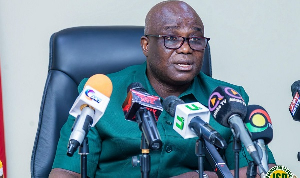By Dr. Michael J.K. Bokor
E-mail: mjbokor@yahoo.com
July 4, 2011
Once again, our politicians have found an easy way to have a big laugh because President J.E.A. Mills has made it possible for them to bite deep into the national cake at the expense of public-sector workers who have been denied End-of-Service Benefits (ESB).
Numerous factors have combined to confirm public fears that our politicians are self-centred. That is where the danger lies for our democracy.
News reports have it that President Mills has authorized the immediate payment of ex-gratia awards to Members of Parliament who served under the fourth Parliament of the Fourth Republic. Details of how much in all will be paid to each beneficiary are not clear but Citi News parliamentary correspondent Richard Sky reports “that on the average, a recipient may receive as much as 80,000 Ghana Cedis.”
This concession must come as a big blow to the Ghanaian tax-payers and workers whose sweat, toil, and blood generate the funds to boost the national coffers that these politicians raid with impunity under the guise of “ex-gratia awards.” The painful fact is that these workers will not get any ex-gratia award and end up retiring without anything apart from whatever they might have saved while in active service.
And it is not as if they can easily put away something substantial from their earnings, considering the ever-rising cost of living in the country. Thus, the ordinary worker is always haunted by the dreary future that awaits him at the end of his service to his country while the politicians grab so much money at the end of just 4 years in Parliament. It is heart-breaking.
What is it about the politicians in Parliament or the Executive that entitles them to ex-gratia awards but which the government doesn’t deem to be applicable to public-sector workers as well?
While the vast majority of Ghanaians continue to cry for improved service conditions and opportunities to live decent lives in retirement, the government seems not to be interested in providing the safety net to alleviate their suffering. Yet, it does all in its power to support the politicians as if they are more Ghanaian than all others or matter most in the workings of our democracy.
We have had numerous occasions to condemn this preferential treatment given to these politicians and don’t want to raise those arguments again; but we will insist that the payment of this kind of benefits to such people is a dirty slap on the face of Ghanaian workers.
Forget about the so-called lengthy back-and-forth arguments over whether the document based on which the funds were to be paid had received proper Parliamentary and Executive approval under the erstwhile Kufuor administration. The stark truth is that President Mills has crumbled and given the green light for this fraud to be perpetrated against Ghanaians.
This fraud can be traced to the dying days of the Rawlings government. For inexplicable reasons, that government abolished public-sector ESB but found it expedient to pay its functionaries those very awards in monetary and material terms. We all saw the murderous enthusiasm with which the beneficiaries grabbed cars (which they sold at ridiculously low prices to themselves) and bags of money calculated on the basis of length of service and degree of commitment to the “revolution.”
These were the apostles of probity and accountability who sought to satisfy themselves while denying others their share of the national cake. Like leeches that will not let go what they had clung to, these functionaries (including Rawlings himself) condemned the Kufuor government for trying to divest them of some of the property that they had expropriated under the ex-gratia award package.
We haven’t yet forgotten Rawlings’ own loud protests against the Kufuor government’s retrieving official vehicles in his custody, which was to become the basis for his implacable anger against Kufuor. The further action to deprive him of other services couched as “protocol” sent Rawlings on an emotional roller-coaster where he has been ever since, even under an NDC regime. If Rawlings has continued to incur the displeasure of public-sector workers, it is the result of this insensitiveness of his government toward their plight within the context this ESB problem. Many wondered why Rawlings would abolish the ESB for public-sector workers and yet go ahead to grant it to functionaries of his government and MPs, which the Kufuor government also retained. There is no moral justification for retaining ex-gratia awards for these politicians. I have insisted that if the government found it economically unwise to pay workers the ESB, why should it reserve such a package for the politicians? As salaried workers, are these politicians any better contributors to the national coffers than other workers?
Our politicians cannot be trusted to act in good faith when it comes to personal gains. We have had too many instances of wickedness in high places and can no more contain the irritation. We want to send this warning across that by singling themselves out for these ex-gratia awards, our politicians are setting the stage for our democracy to be undermined.
I have no particular method that anybody may use to do so; but it should be obvious to any level-headed person that when the government of the day colludes with members of the Legislature to fleece the national coffers under the banner of “ex-gratia awards,” it is doing nothing but instilling venom in the people. The government will cause disaffection and force the disgruntled citizens to do the inevitable. It can’t be ruled out that sabotage or open physical confrontations through industrial actions could be used to register public anger at such a sordid discrimination against workers.
At a time when public-sector workers are complaining about problems associated with their being migrated to the single spine salary structure—or when salaries are abysmally low and can’t support workers—the government shouldn’t be rubbing salt in people’s wounds.
Unfortunately, that seems to be the norm. The government has chosen to reward members of the Legislature, disregarding threats from the labor front (teachers at the various levels, doctors, nurses and other paramedical staff, etc.) to lay down their tools in demand for better service conditions. This decision to pay the ex-gratia awards to these politicians has come at the wrong time and will set the tone for agitations across-the-board at the labor front.
It is really painful to realize that these industrial workers or providers of essential services being denied ex-gratia awards play more directly beneficial roles in the society than these noise-making politicians. We just have to consider how we feel when nurses, teachers, and doctors go on strike to know their importance. They far outweigh these lying, thieving, and calculating politicians. Let them go on strike and our society will lose nothing!! Such undeserved awards/benefits create the misleading impression that Ghanaian politics is a goldmine; hence, the rush into it by all manner of people, mostly those who couldn’t achieve success in their chosen career fields. They are all parading themselves as problem-solvers just to enter the corridors of power to manipulate the system.
We know that democracy is expensive; and for us to “grow” ours, we need to provide incentives to those who play the pivotal role in it. We may be tempted, then, to view our politicians as essential cogs in the wheel. But they aren’t any more essential than the teachers who prepare the future leaders or the nurses and doctors who attend to them when they fall sick.
By concentrating on satisfying these politicians to the disadvantage of all others who also depend on the national coffers, the government is setting a nasty example that shouldn't be tolerated at all. This practice of preferential treatment is dangerous and must be discouraged. President Mills owes us a serious apology for back-tracking to do the wrong thing. He has demonstrated how malleable he is and proved to me that he isn’t different in any way from those we’ve already had whose precedent he is following within this context of ex-gratia awards. It is a lop-sided action that must be condemned outright.
We all disagreed with the quantum of benefits that the Chinery-Hesse Commission specified for ex-President Kufuor and how Rawlings repudiated what was earmarked for him. We heard all that President Mills did when he stopped the payment of the ESB. But rather shockingly, those beneficiaries were paid whatever was meant for them “through the back door.” The government didn’t inform the public that it had approved the payment of the ESB or how much it entailed. All we heard was that Kufuor (and Rawlings too?) had been paid. Is this how a government that claims to be democratic should operate? Where is the transparency or truth in its handling of affairs?
I am highly disappointed that after initially making moves to suggest that he was not in favour of this ex-gratia award package for the politicians, President Mills should turn round to give it his blessing. What must have happened for him to turn the table against himself this way?
We will continue to protest at the collusion between the Executive and the Legislature for mutual benefits while the vast majority of Ghanaians continue to languish in poverty. The 5,000 or more schools-under-trees could have benefited from that huge chunk of ex-gratia money. The money can be better spent to support the 51 percent of Ghanaian migrants living in slums and under deplorable conditions in the urban areas (according to data from the Ministry of Local Government and Rural Development. Newly engaged teachers haven’t been paid for over 54 months, according to some reports.
We have said it several times already and will continue to say it that our democracy cannot mature unless our leaders do what will encourage the people to participate effectively in it. That effective participation must not be misconstrued as a mere matter of the “political” (opportunities for free-and-fair franchise, or absence of military intervention). It needs the “economic” element to prop it up. That’s why governments that cherish democracy insist that the people maximize productivity and create the favourable conditions for equitable distribution of the national cake. When those who sacrifice their lot to raise productivity are denied the fruit of their labour, they will become embittered and resort to acts that will threaten that democracy.
No viable democracy can thrive where there is poverty because in principle and practice, democracy is expensive. It calls for more than the opportunity to vote at election time; and it cannot survive in an atmosphere of wanton disregard for the interests of those whose participation it needs. The Ghanaian experiment may be gathering years (the 4th Republic is 19 years old now) but anybody who will claim that it is maturing must be walking with his head down. For as long as our politicians manipulate the system for personal gains at the expense of the vast majority of Ghanaian workers, our democracy will remain endangered.
Opinions of Saturday, 16 July 2011
Columnist: Bokor, Michael J. K.














